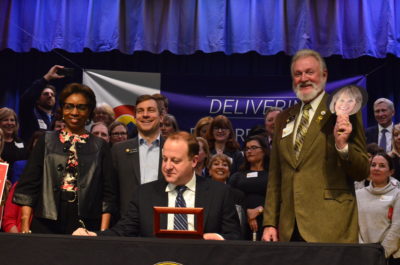Colorado Gov. Jared Polis signed HB 19-1262, the Colorado Full-Day Kindergarten Bill on Tuesday, May 21. The ceremony at the Colorado State Capital included a band, lots of children and representatives of a cross-section of the states educational and early childhood education proponents.

Colorado Gov. Jared Polis signed HB 19-1262 into law on Tuesday, while to his left, District 60 Representative Jim Wilson waves in triumph. Wilson, a Republican, sponsored the bill in the Colorado House.
Polis, who has been a long-time supporter of the effort, actively promoted it as one of his signature campaign promises in the run-up to the November 2018 election. The bill passed the Colorado State Senate on April 26 and passed its final review by the Colorado House of Representatives on April 30, with a vote of 55-10. That day the governor was appearing at the Colorado Education Policy Networking Series to talk about his support for the bill.
“Some people think that government moves slowly … that this could take a year or two,” said Polis the day of the Senate vote. “No, this is this fall – free full-day kindergarten this August and 5,100 more funded preschool slots.”
HB19-1262 funds universal full-day kindergarten in Colorado in 178 school districts, extending the option for full-day kindergarten to every family in Colorado. It also adds 5,100 pre-k slots in school districts. Some across the state, include District 60 Rep. Jim Wilson (R), who sponsored the legislation in the House, have been telling those opposed to it, to understand that this is the direction the state is moving. The bill was carried in the Colorado Senate by Sen. Jeff Bridges (D-Greenwood Village) and Sen. Rhonda Fields (D-Aurora) to fund full-day kindergarten for families across the state.
Roughly 20 percent of Colorado kindergartners are not enrolled in a full-day program, according to the Colorado Department of Education. The other 80 percent of students attending full-day kindergarten do so through a combination of tuition, scholarships, and/or local taxes. For those schools that do offer full-day kindergarten free of change, many have offered it by sacrificing other critical programming.
“You can either get out of the way, get on, or get run over,” said Wilson, a former school superintendent, speaking about full-day kindergarten. “And here it is. It’s coming into the station.”
As the bill is signed into law today, it immediately expands the resources Colorado is offering families with young children. It will fund full-day kindergarten just as other grades are funded. The bill will also prohibit districts from charging tuition and provide more funding in districts that already stepped up to cover the cost for full-day classes.
Under current law, the state has only funded half-day kindergarten. To pay for the other half, school districts have had to either spend their local dollars or charge parents tuition. During this most recent school year, some 78 percent of kindergartners were enrolled in full-day programs, a 64 percent increase in enrollment since 2001. The increase reflects both the shared view to better-prepare children for elementary school, as well as parents’ desires to give their children a better educational foundation.
Supporters say the bill has added significance in cash-strapped, rural school districts and counties with high percentages of lower-income families or which have experienced economic distress.
For more information on HB19-1262, visit www.leg.colorado.gov/bills/hb19-1262.








Recent Comments